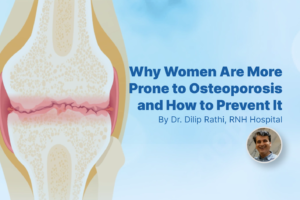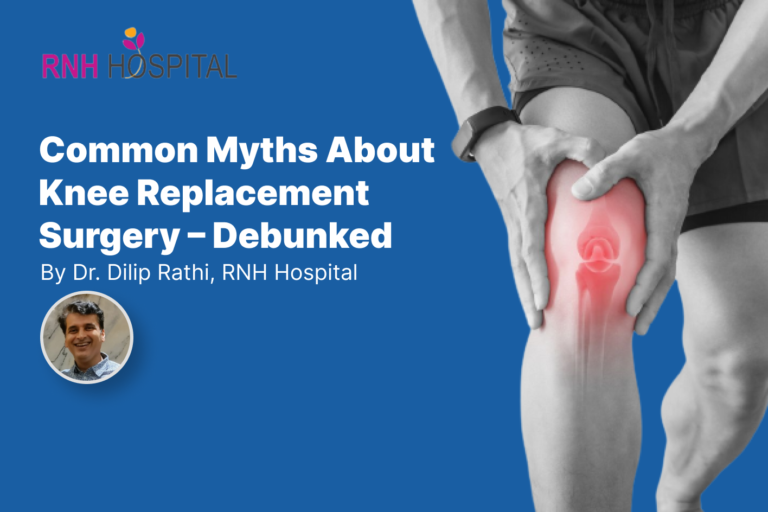Why women are more prone to Osteoporosis and how to prevent It
Why Women Are More Prone to Osteoporosis and How to Prevent It
By Dr. Dilip Rathi, Orthopedic Surgeon & Director, RNH Hospital
Osteoporosis is a silent disease that weakens bones, making them more fragile and prone to fractures. While it can affect both men and women, women are at a significantly higher risk. Understanding why this happens and how to prevent it can help maintain strong and healthy bones throughout life.
Why Are Women More Prone to Osteoporosis?
- Hormonal Changes: Estrogen, a hormone that protects bone strength, declines rapidly after menopause. This leads to increased bone loss, making postmenopausal women highly susceptible to osteoporosis.
- Lower Bone Mass: Women generally have smaller and thinner bones compared to men. This naturally puts them at a higher risk of fractures as bone density decreases with age.
- Pregnancy and Lactation: The body uses calcium to support fetal growth during pregnancy and milk production during breastfeeding. If not replenished through diet, this can contribute to bone loss.
- Longer Life Expectancy: Women tend to live longer than men, which means they experience more years of gradual bone loss, further increasing the risk of osteoporosis-related fractures.
How to Prevent Osteoporosis?
- Ensure a Calcium-Rich Diet: Calcium is essential for bone health. Include dairy products, leafy greens, almonds, and fortified foods in your diet. Adults need around 1,000-1,200 mg of calcium daily.
- Get Enough Vitamin D: Vitamin D helps the body absorb calcium effectively. Sunlight is a natural source, but supplements or vitamin D-rich foods like fish, eggs, and fortified dairy products can also help.
- Engage in Regular Exercise: Weight-bearing exercises like walking, jogging, dancing, and strength training help maintain bone strength and prevent loss of bone density.
- Avoid Smoking and Excessive Alcohol: Smoking and heavy alcohol consumption can weaken bones and increase the risk of fractures.
- Regular Bone Density Tests: Women above the age of 50, especially postmenopausal women, should undergo bone density scans to assess their bone health and take preventive measures if needed.
Early Diagnosis is Key
Osteoporosis is often called a ‘silent disease’ because it does not show symptoms until a fracture occurs. If you experience frequent back pain, loss of height, or fractures from minor falls, it may be a sign of weakening bones.
At RNH Hospital, we specialize in bone health, osteoporosis treatment, and preventive care. Our expert team provides comprehensive diagnosis, personalized treatment plans, and advanced medical solutions to manage osteoporosis effectively.
If you or your loved ones are at risk, visit RNH Hospital today for a consultation. Early intervention can help maintain strong bones and prevent future complications.
Stay Strong, Stay Healthy!
Choose RNH Hospital for Orthopedic Care?
RNH Hospital stands as the most advanced orthopedic Hospital in Central India, renowned for its excellence in orthopedic care and robotic joint replacements, arthroscopic surgeries, and sports medicine. Our commitment to precision, patient-centric care, and state-of-the-art technology ensures optimal surgical outcomes. With a team of highly experienced orthopedic surgeons, including Dr. Dilip Rathi and Dr. Mukesh Laddha, we provide world-class treatment tailored to each patient’s needs.
For any type of Orthopedic care, trust RNH Hospital for the best solutions. Contact us today and take the first step towards pain-free movement and a better quality of life.
RNH HOSPITAL | NABH-ACCREDITED ADVANCED ORTHOPAEDIC CENTER
📞 Contact at +91 712 242 0044 | +91 907 501 7478 to learn more about our specialized treatments and personalized patient care!
Sports Injuries and Recovery: The Role of Advanced Orthopedic Treatments
Sports Injuries & Recovery: The Role of Advanced Orthopedic Treatments...
Read MoreWhy women are more prone to Osteoporosis and how to prevent It
Why Women Are More Prone to Osteoporosis and How to...
Read More









One Comment